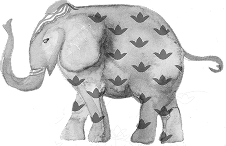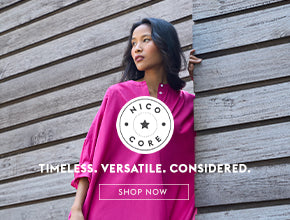Where culture meets commerce
Born at the intersection of design and technology, fashion and lifestyle label Nicobar has an unconventional branding strategy that is set to change the way modern Indians shop.
She was the CEO of India’s leading design label, Good Earth. He was an investment banker and private equity professional in New York, at Goldman Sachs after an MBA at Harvard Business School. Together, they set out to build a company that would thrive at intersections: of east and west, of design and technology, online and offline. After 18 months of research and development, Nicobar was born. Husband-wife duo Raul Rai and Simran Lal founded Nicobar in March 2016, under the family owned entity Eicher Goodearth Pvt. Ltd, which also owns the Good Earth chain of stores. The new brand has set out to spearhead modern Indian lifestyle retail at a global level. With seven stores up and running — across Delhi, Mumbai, Bengaluru, Chennai and Jodhpur — and three more in the offing, the label offers an interesting mix of fashion, home and travel accessories with a minimalistic aesthetic, targeted at
millennials and lobetrotters.
Stylist and designer Aparna Chandra, known for breezy designs, heads the fashion division; interior stylist and product designer Divya Kapoor creates the travel line, and brand and home designer Arya Nerker looks after home.
Nicobar’s natural, breathable fabrics also hold another story: an identity that integrates into the ethos of India. The idea of the brand is not just to sell products, but also to create the experience of modern India that Nicobar is aligned with, says Rai. Besides brick-and- mortar outlets, they retail through an engaging e-store, Nicobar.com. This features ‘Nico Journal’, a digital magazine that curates products and services from other brands, firms, even eateries that represent the philosophy that Nicobar espouses.
“The online magazine is an attempt to curate lifestyle thought leaders, whether it’s the eclectic catering firm CAARA or award winning menswear designer Suket Dhir. These are the people we believe exemplify modern India,” says Rai.
“Emotional engagement and ease of shopping are the cornerstones of our retail philosophy,” says brand head Nirmal Kaur. Investing in distinctive customer engagement and retention, Nicobar has developed an impressive outreach strategy of tying up with like-minded groups of people and hosting events without an apparent sales incentive. For instance, Nicobar recently hosted events for Sofar Sounds, a worldwide community of artists and music lovers, spread across a network of more than 300 cities globally. It is run by volunteers who set up ‘secret gigs’ at undisclosed venues; here, three varied artists perform in a 90- minute show. Music lovers signed up to compete for a seat, and the event is self sustaining with voluntary contribution from guests. Nicobar hosted two events for Sofar, at its Kala Ghoda store in Mumbai, and its head office in Delhi. On the bill were Ankur Tewari and the Ghalat Family, Tanya Nambiar, SETI X, Fame The Band, Chaos in the Capital and April Fool Child. Each gig saw about 80 people attend.
The label has been launched with an innovative omni-channel retail model, and the founders expect to break even within the next 15 months. Nicobar garments are made using natural, breathable fabrics, prints and textures that are Indian in essence but with clean silhouettes, neutral colours and a design vocabulary that would be at ease anywhere in the world. With almost 70 per cent of their product base in clothing, regular pop-ups have worked well in Tier-1 and Tier-2 cities, even abroad. In the past year, Nicobar has
held 11 such pop-ups — in Delhi, Jaipur (at Kyoorius Designyatra), Ranthambore, Mumbai, Goa, Kochi (at the Kochi Biennale), Dubai and Abu Dhabi. Another five are slated for this year.
Nicobar also partnered with Kommune — a collective of artists, producers, patrons, collaborators and art lovers who come together in a sort of performing-arts incubator. Together, they hosted evenings to ‘bring back good old storytelling’. “We always imagined Nicobar to be a mix of culture and commerce,” says Kaur. “The idea is to host sub-cultured engagements that resonate with the brand; uplifting and thought- provoking.” Nicobar hosted the first edition of Kommune’s Story Slam at its Kala Ghoda store in Mumbai in May 2017; it was the group’s first ever storytelling ‘open mic’, where they would pick a winning story to feature on their channels and for a cash prize. Kommune founder Roshan Abbas hosted the event, which saw about 90 guests. Nicobar’s online store also features videos that communicate its story to the customer through product highlights — such as travel packing guides or how to get a particular look —and an interactive look-book.
The website itself has been carefully constructed by an in-house technology team, using the brand’s minimal colour palette and young, global aesthetic. They also have a strong social media presence, relying on arresting visuals. About 15 to 20 per cent of their online revenue comes from international markets like the US, Singapore, the Middle East, Hong Kong and Australia. Nicotides is their biggest initiative, and a long-term one. Every full moon and new moon, something special happens at Nicobar — free home trials, a surprise gift with every purchase, free shipping, new capsule collections and so on. The young label is now looking at innovative digital integration and experiential spaces such as curated book corners, photo booths, mini theatres and entrepreneur hubs.
It’s filling in the intersections nicely, holding a lot on its minimalist plate.


















 GET IN TOUCH
GET IN TOUCH